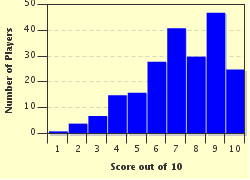Quiz Answer Key and Fun Facts
1. Who was crowned 'August Caesar' on December 25, 800 C.E.?
2. Which figure of the Protestant Reformation is associated most closely with the doctrine of Predestination?
3. The series of wars fought by Carthage and Rome were called what?
4. In Europe, what was the idea that the monarch (king or queen) was appointed by God and made decisions by his grace?
5. Which of the following did Jean-Baptiste Colbert NOT do?
6. What was the importance of the Battle of Tours (732 C.E.)?
7. Who was the first Roman emperor?
8. Which of the following was written by William Shakespeare?
9. Which Spanish conquistador conquered the Incan Empire?
10. What was the name of the temple, built in Athena's honor, which was built during the "Golden Age" of Athens?
Source: Author
History1066
This quiz was reviewed by FunTrivia editor
bloomsby before going online.
Any errors found in FunTrivia content are routinely corrected through our feedback system.


